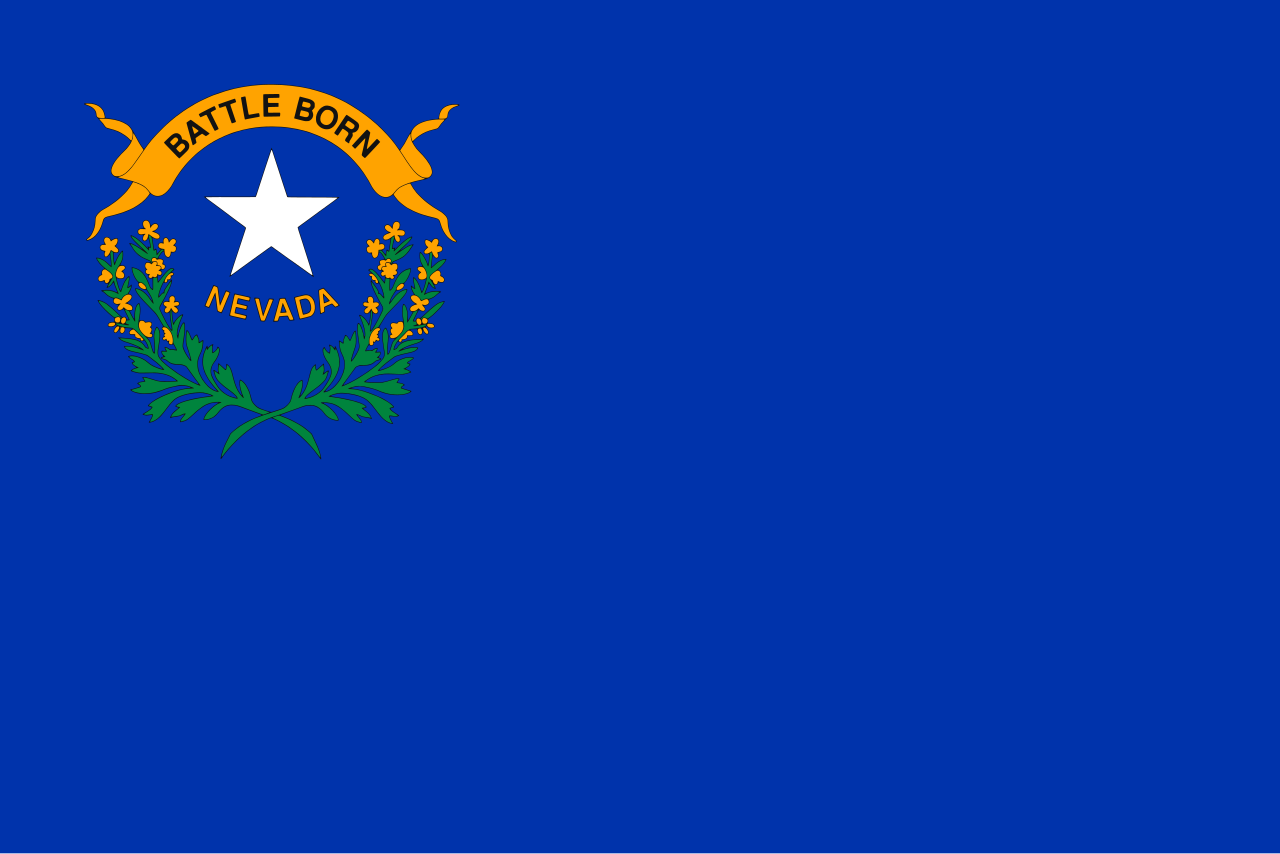
- + Permitless open carry, permissive concealed
- + Minimal firearm restrictions
- - Some registration required
- + Minimal purchase restrictions
- + Strong self-defense laws
- + Permissive transport laws

Nevada requires a Concealed Carry Permit (CCW) to carry concealed handguns (NRS 202.3657). Anyone 21 or older who can legally possess a firearm can apply after completing an 8-hour training course, passing a background check, and submitting fingerprints. Permits are issued by county sheriffs. Concealed carry is banned in schools, airports, and casinos without permission (NRS 202.3673). Private property owners can prohibit firearms with signs. Violations can lead to a misdemeanor (up to 6 months) or felony (up to 5 years) in restricted areas.
Costs: A CCW costs $60-$100 (varies by county), plus $25-$40 for fingerprints and $50-$150 for training. Total is typically $135-$290.
Processing Time: Permits are processed within 120 days.
Renewal: A CCW lasts 5 years and costs $25-$60 to renew, with a 4-hour refresher course ($50-$100).
Reciprocity: Nevada honors permits from 28 states, like Utah and Arizona. A Nevada CCW is recognized by 24 states, including Idaho and Montana.
Nevada allows open carry of handguns and long guns without a permit for anyone 18 or older who can legally possess a firearm (NRS 202.257). No holster is required, but firearms must be visible. Open carry is banned in schools, airports, and public buildings with metal detectors (NRS 202.3673). Private businesses can ban it with signage. Violations can result in a misdemeanor (up to 6 months) or felony (up to 5 years) in restricted zones.
Nevada has few state restrictions on firearm types. Assault weapons and large-capacity magazines are legal with no limits (NRS 202.253). Silencers, short-barreled rifles/shotguns, and machine guns are allowed if registered with the ATF (26 U.S.C. § 5861). Ghost guns are legal but must be serialized by 2025 under AB 286 (NRS 202.3625). Felons can’t possess firearms (NRS 202.360). Federal violations can lead to felony charges (up to 10 years).
Costs: Federal tax stamps for NFA items cost $200 each. Serialization costs vary ($20-$50).
Nevada follows the federal Firearms Owners’ Protection Act (FOPA) (18 U.S.C. § 926A) for interstate travel. Firearms must be unloaded and in a locked container if passing through restrictive states. Nevada allows open or concealed carry (with CCW) in vehicles (NRS 202.257). Carry is banned in federal facilities and restricted areas like schools (NRS 202.3673). Violations can lead to a misdemeanor (up to 6 months) or felony (up to 5 years).
Nevada has no state permits or waiting periods for buying firearms (NRS 202.253). You must be 21 for handguns or 18 for long guns and pass a federal background check for dealer sales (18 U.S.C. § 922). Private sales require no checks unless the buyer is prohibited (e.g., felons) (NRS 202.254). Violations can lead to felony charges (up to 5 years).
Costs: Background checks are free at sale; dealers may add $10-$25.
Nevada does not require general firearm registration, but AB 286 mandates serialization of ghost guns by 2025 (NRS 202.3625). Clark County requires handgun registration within 60 days of residency (NRS 202.3662). Federal NFA items like machine guns must be registered (26 U.S.C. § 5861). Violations can lead to misdemeanor (up to 6 months) or felony (up to 5 years) charges.
Costs: Serialization costs $20-$50; Clark County registration is $25.
Nevada has no state-mandated storage laws. No child access prevention law exists, but reckless endangerment applies if a minor accesses a gun and causes harm (NRS 200.030). No reporting is required for lost or stolen firearms. Penalties can be a misdemeanor (up to 6 months) or felony (up to 5 years) if injury occurs.manage
Sources: [1]
Nevada has a strong Castle Doctrine and Stand Your Ground law (NRS 200.120). You can use deadly force in your home or vehicle if someone enters unlawfully and you believe it’s necessary to prevent harm. There’s no duty to retreat anywhere you’re legally allowed to be. Excessive force can lead to manslaughter charges (up to 10 years).
Sources: [1]